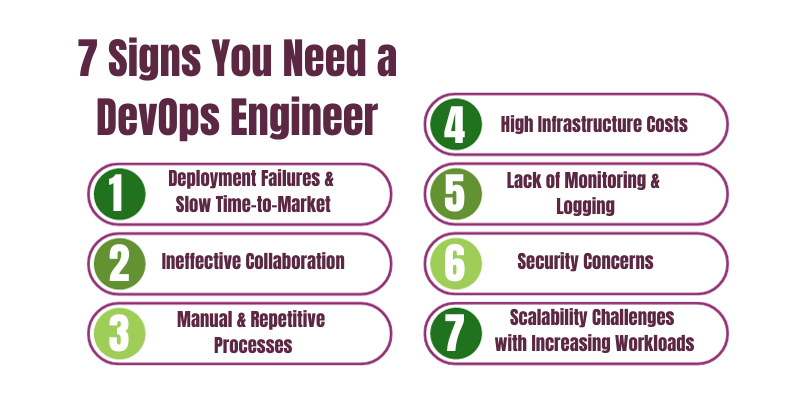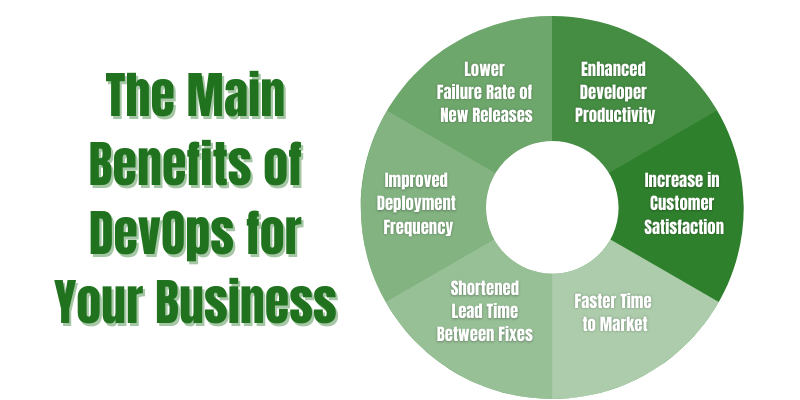7 Signs You Need to Hire a DevOps Engineer in 2024

Discover the top 7 signs that indicate your business needs to hire a DevOps engineer. Plus, we'll explore why DevOps is crucial for businesses seeking to improve their development processes and enhance productivity in 2024.
What is DevOps and Why is it Important?
A modern approach to software development, DevOps combines development and operations to streamline the software delivery process.
Definition of DevOps
DevOps, a combination of "development" and "operations," refers to a set of practices, principles, and cultural philosophies aimed at improving collaboration and communication between software development (Dev) and IT operations (Ops) teams.
The primary goal of DevOps is to streamline the software delivery lifecycle, from initial development through testing, deployment, and maintenance, fostering a more efficient and collaborative approach to delivering high-quality software at a faster pace.
A DevOps approach emphasizes automation, continuous integration, continuous delivery, and a culture of shared responsibility, enabling organizations to respond rapidly to changing business requirements and deliver value to end-users more effectively.

Signs That Indicate You Need to Hire a DevOps Team
1. Deployment Failures and Slow Time-to-Market:
Frequent deployment failures coupled with a slow time-to-market can be indicative of underlying inefficiencies in the development and deployment pipeline. Delays in bringing products or features to market can significantly impact your competitiveness. A DevOps engineer can address this by implementing robust CI/CD pipelines, ensuring quicker and more reliable releases.
2. Ineffective Collaboration and Low Developer Productivity:
Issues in collaboration between development and operations teams can lead to low developer productivity. A DevOps engineer excels in fostering collaboration, breaking down silos, and implementing automation to enhance overall productivity.
3. Manual and Repetitive Processes
If your organization relies heavily on manual and repetitive processes for tasks like configuration management, provisioning, and scaling, a DevOps engineer can automate these processes, saving time and reducing the risk of human error.
4. High Infrastructure Costs
Rising infrastructure costs without a clear understanding of resource utilization may signal the need for a DevOps engineer. These professionals can optimize infrastructure, implement cloud solutions, and leverage containerization technologies to ensure efficient resource allocation.
5. Lack of Monitoring and Logging
Insufficient monitoring and logging can lead to delayed identification and resolution of issues, affecting system reliability. A DevOps engineer can implement robust monitoring and logging solutions to proactively detect and address potential problems.
6. Security Concerns
Security is a critical aspect of any IT infrastructure. If your organization is grappling with security vulnerabilities or lacks a comprehensive security strategy, a DevOps engineer can integrate security measures into the development and deployment processes, ensuring a more secure and resilient system.
7. Scalability Challenges with Increasing Workloads:
As your business grows, scalability challenges may arise. A DevOps engineer is well-equipped to design scalable architectures, implement auto-scaling solutions, and ensure your systems can handle increased workloads seamlessly.

DevOps Versus Traditional Software Development
The evolution of development and operations teams in DevOps marks a significant departure from traditional software development methods. DevOps culture emphasizes collaboration, transparency, and shared ownership, leading to a more cohesive and efficient development process.
When it comes to the difference between roles, DevOps engineers focus on the development and maintenance of software release systems, collaboration with the software development team, aligning with industry standards, and employing DevOps tools.
In contrast, software engineers focus on developing applications and solutions that operate on different operating systems, catering to specific user needs.
Read More: Cloud Engineer vs Software Engineer
The Role of a Full-Time DevOps Engineer
A DevOps engineer plays a pivotal role in driving the successful implementation of DevOps practices within an organization. Their key responsibilities include promoting collaboration between development and operations teams, automating processes to streamline product delivery, and ensuring the continuous integration and deployment of software.
Organizations need DevOps engineers to harness the full potential of DevOps principles. With their expertise in automation, deployment, and infrastructure management, a dedicated DevOps engineer can transform a conventional development team into a highly efficient and productive unit.
How many DevOps engineers do you need for your team? While there's not an official number, the ideal Developer to DevOps engineer ratio is 5:1, and in large software organizations, like Google, the ratio is 6:1.

Benefits of DevOps
Employing a DevOps engineer or team offers numerous benefits, including:
- Improved deployment frequency
- Faster time to market
- Lower failure rate of new releases
- Shortened lead time between fixes
- Enhanced developer productivity
- Contribution to delivering more reliable and customer-friendly software
- Positive shift in customer satisfaction and overall product quality
Additionally, for most modern businesses that have moved to the cloud -- such as GPC, AWS, or Azure-- DevOps engineers play a crucial role in managing and optimizing cloud environments. Their expertise extends to various aspects of cloud infrastructure and services, such as FinOps, automation, CI/CD, and more, and they contribute significantly to the effective implementation of DevOps practices in the cloud.
These advantages make having a DevOps engineer or team essential for organizations aiming to stay competitive in a rapidly evolving technological landscape.
Importance for Modern Businesses
DevOps is rapidly transitioning from a specialized approach to a mainstream strategy. Its adoption soared from 33% of companies in 2017 to 63% in 2020, mirroring the broader shift towards cloud computing.
The importance of DevOps in modern businesses cannot be overstated. It is instrumental in creating a culture of collaboration and shared responsibility among development and operations teams. This approach fosters a more efficient and effective workflow, leading to faster product development and deployment.
Read More: Essential DevOps Statistics and Trends for Hiring in 2024
Challenges of DevOps Implementation
Identifying the challenges of DevOps adoption is crucial for businesses looking to implement this methodology successfully. Common obstacles include resistance to change, cultural barriers within the organization, the cost of hiring DevOps engineers, and the complexity of integrating new tools and processes into existing workflows.
To overcome obstacles in implementing DevOps, organizations need to focus on fostering a culture of collaboration and openness to change. Encouraging transparency and communication across teams, providing adequate training and resources, and gradually introducing DevOps practices can help mitigate these challenges.
Another difficulty is hiring high-quality DevOps engineers who can do this complicated and highly technical work. A best practice for hiring DevOps engineers is to use DevOps assessments to ensure you select high-caliber candidates.
Read More: Case Study: DevOps Assessments Streamlined EclecticIQ's Hiring Process

Future of DevOps
The future of DevOps is significant, especially as businesses increasingly rely on software development to drive innovation and competitiveness.
By 2025, over 85% of organizations are expected to adopt a cloud computing strategy, aligning closely with the integration of DevOps practices. The need to hire a DevOps engineer is more pronounced than ever, given the rapid evolution of technology and the increasing demand for scalable and reliable software solutions.
Embracing DevOps is not just an option; it is a necessity for organizations striving to stay relevant and agile in a constantly evolving marketplace.
